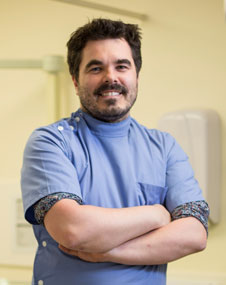 Monday 1 October 2018 11:15am
Monday 1 October 2018 11:15am
High unmet need for dental care is causing pain, embarrassment, worry and reducing quality of life among Syrian refugees, new University of Otago research shows.
The research, based on a survey of 62 adult Syrian refugees resettled in Dunedin over the past few years, found a very high level of unmet oral health need, while financial issues are perceived as a barrier to them receiving oral health care.
Lead researcher Associate Professor Jonathan Broadbent from the Faculty of Dentistry, says little is known about oral health among Syrian refugees. While the research did not investigate whether similar refugees in other parts of the country are experiencing the same problems, he expects the situation to be similar nationally.
As a result of the evidence collected, he is now calling for a national protocol to standardise what dental care services are available and funded and how they should be accessed.
“Access to post-settlement oral health care for refugees is currently unsatisfactory, and dental clinicians and refugees are both placed into a different situation when pathways are unclear,” Associate Professor Broadbent says in the research paper recently published in the NZ Dental Journal.
“Oral health care should be accessible to refugees and other at-risk population groups to ensure they enjoy good oral health and overall well-being, and that their human rights are being realised,” he says.
“It is concerning that more than 70 per cent of former refugees reported current dental pain and fewer than 40 per cent had a dental check-up within the 18 months since their arrival.”
The majority perceived their oral health as “poor” or “very poor”. Many made additional comments about their dental problems. One participant stated: “I am very tired from all the dental problems I have, no one contacted me for dental treatment, please help me.” Another stated: “I want treatment because I feel self-conscious and have no confidence to smile. I feel like I have a bad smell all the time from my mouth.”
In New Zealand, newly-arrived refugees spend six weeks on an orientation programme at the Mangere Refugee Settlement Centre in Auckland. Their orientation includes an oral health screening and treatment for emergency dental problems.
Almost all refugees quality for limited financial assistance for dental care in New Zealand. However, nearly half reported they had not received assistance and many were not aware of the options available to them.
This research did not involve collection of clinical examination data, which Associate Professor Broadbent says should be done in future research to better quantify dental care need requirements nationally among Syrian refugees.
However, this lack of clinical data should not stand in the way of efforts to improve care, he says. As a practising dentist who has treated some of these patients, he characterises their dental health needs as very high.
For further information, please contact:
Associate Professor Jonathan Broadbent
Faculty of Dentistry
Tel 03 479 7879
Email jonathan.broadbent@otago.ac.nz
Liane Topham-Kindley
Senior Communications Adviser
Tel 03 479 9065
Mob 021 279 9065
Email liane.topham-kindley@xtra.co.nz
Electronic addresses (including email accounts, instant messaging services, or telephone accounts) published on this page are for the sole purpose of contact with the individuals concerned, in their capacity as officers, employees or students of the University of Otago, or their respective organisation. Publication of any such electronic address is not to be taken as consent to receive unsolicited commercial electronic messages by the address holder.
FIND an Otago Expert
Use our Media Expertise Database to find an Otago researcher for media comment.